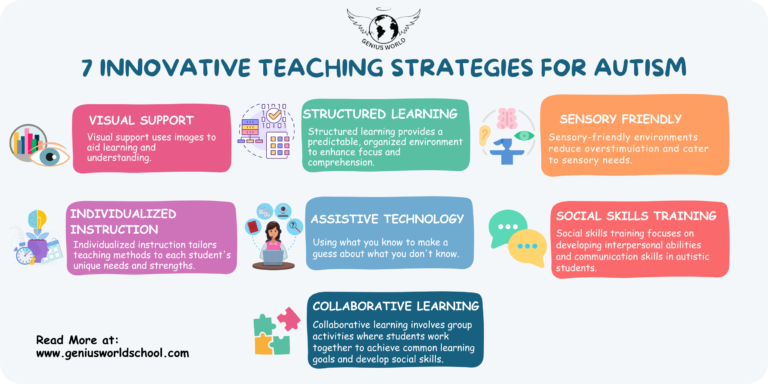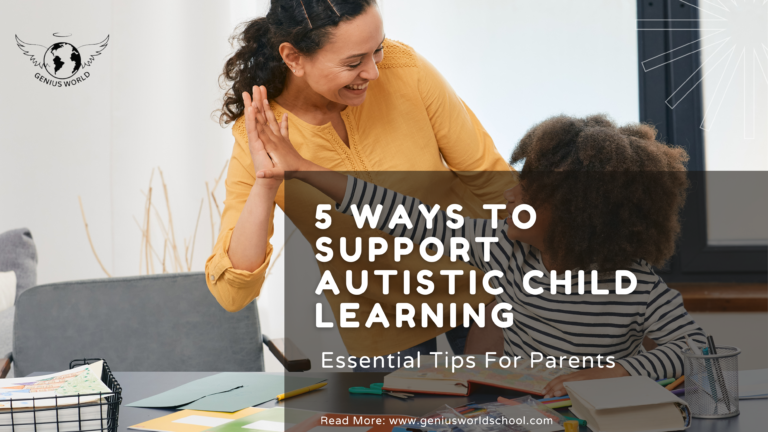5 Key Benefits and Strategies of Early Intervention in Autism
Autism Spectrum Disorder (ASD) is a neurodevelopmental condition that affects autism communication development, social interaction, and behavior. Early intervention plays a crucial role in improving outcomes for children with autism. This blog post will explore the key benefits of early intervention and provide effective strategies for parents and caregivers.
The Importance of Early Intervention
Early intervention refers to providing comprehensive services to young children with developmental delays or disabilities. For children with autism, early intervention is essential for maximizing their potential and improving their quality of life.
Key Benefits of Early Intervention
- Enhanced communication and social skills: Early intervention helps children develop essential communication and social skills.
- Improved behavior: Early intervention can address challenging behaviors and teach appropriate coping mechanisms.
- Accelerated learning and development: Children with autism can make significant progress in cognitive, motor, and adaptive skills.
- Increased independence: Early intervention empowers children to become more self-sufficient.
- Stronger parent-child bond: Early intervention provides support and guidance for parents, strengthening the parent-child relationship.
Effective Early Intervention Strategies
- Individualized education programs (IEPs): Developing tailored plans to meet specific needs.
- Applied behavior analysis (ABA): Using evidence-based techniques to teach new skills.
- Speech and language therapy: Addressing autism communication development challenges.
- Occupational therapy: Improving fine and gross motor skills, sensory processing, and daily living skills.
- Play-based learning: Creating engaging and fun learning experiences.
Understanding Early Intervention in Autism
Early intervention is a crucial component in supporting children with Autism Spectrum Disorder (ASD). It involves providing specialized services and therapies to young children with developmental delays or disabilities. The goal of early intervention is to address developmental needs as soon as possible, maximizing a child’s potential for growth and independence.
Importance of Early Diagnosis and Timely Intervention
The earlier children with autism receive appropriate interventions, the better their outcomes tend to be. Early intervention capitalizes on the brain’s plasticity, allowing for significant improvements in communication, social skills, behavior, and overall development. Identifying autism early and initiating intervention services promptly is essential for optimizing a child’s future.
Benefit 1: Improved Communication Skills

Effective communication is fundamental for social interaction and learning. Early intervention plays a crucial role in developing these essential skills for children with autism.
How Early Intervention Helps
Early intervention programs focus on:
- Identifying communication strengths: Recognizing and building upon existing communication skills.
- Teaching alternative communication methods: Introducing visual aids, sign language, or speech-generating devices as needed.
- Encouraging social interaction: Creating opportunities for children to practice communication in various settings.
- Building vocabulary and language skills: Expanding expressive and receptive language through targeted interventions.
Success Stories and Examples
Many children with autism who receive early intervention demonstrate significant improvements in communication skills. For example, a child who initially relied on gestures might progress to using simple words and phrases. Others may develop the ability to engage in back-and-forth conversations and build friendships.
Strategies for Parents and Educators
To support autism communication development at home and in the classroom:
- Model clear and consistent language: Use simple and age-appropriate vocabulary.
- Create a communication-rich environment: Fill the child’s world with opportunities for language learning.
- Use visual supports: Incorporate pictures, symbols, and schedules to aid understanding.
- Practice turn-taking: Engage in interactive activities that promote back-and-forth communication.
- Celebrate milestones: Acknowledge and reward communication achievements.
By implementing these strategies and seeking early intervention services, parents and educators can help autism communication development skills that they need to thrive.
Benefit 2: Autism Social Skills Training

Strong social skills are essential for a child’s overall development and well-being. Early intervention plays a vital role in building these crucial skills for children with autism.
Importance of Social Skills
Social skills are fundamental for forming friendships, building relationships, and participating in community activities. Children with autism often face challenges in understanding and responding to social cues, making early intervention crucial for their social development.
How Early Intervention Programs Focus on Social Skill Enhancement
Early intervention programs address autism social skills training through:
- Social stories: Using narratives to explain social situations and expected behaviors.
- Role-playing: Practicing social interactions in a safe and supportive environment.
- Peer interactions: Creating opportunities for children to play and interact with others.
- Social skills groups: Providing structured settings for practicing social skills.
Practical Tips for Fostering Social Interactions
Parents and caregivers can support social skill development by:
- Modeling appropriate social behaviors: Demonstrating desired interactions.
- Using visual supports: Employing visual aids to explain social cues and expectations.
- Encouraging joint attention: Sharing focus on objects or activities with the child.
- Providing opportunities for practice: Creating social playdates and attending community events.
By prioritizing social skills development through early intervention, parents and caregivers can equip children with autism with the tools they need to build meaningful connections and thrive in their communities.
Benefit 3: Better Academic Performance

Early intervention has a profound impact on a child’s academic journey. By addressing developmental needs early on, children with autism can overcome challenges and achieve their full potential.
Impact of Early Intervention on Academic Achievements
Research consistently demonstrates that early intervention leads to improved autism academic success for children with autism. These benefits include autism academic success like:
- Enhanced cognitive skills: Early intervention helps develop attention, memory, and problem-solving abilities.
- Improved language and literacy: Children with autism often benefit from early language and literacy interventions.
- Stronger foundational skills: Early intervention builds essential skills like fine motor skills, visual perception, and auditory processing.
Success Stories and Case Studies Demonstrating Improved Academic Outcomes
Numerous studies and case studies highlight the positive impact of early intervention on academic performance. Children who receive early intervention are more likely to:
- Achieve grade-level benchmarks
- Demonstrate improved reading and math skills
- Transition successfully to mainstream classrooms
Strategies to Support Academic Learning from an Early Age
To support academic learning, parents and educators can:
- Use visual aids: Incorporate pictures, diagrams, and charts to enhance understanding.
- Break down tasks: Divide complex assignments into smaller, manageable steps.
- Provide consistent routines: Create a predictable learning environment.
- Offer positive reinforcement: Reward effort and progress.
- Collaborate with teachers: Work closely with educators to support academic goals.
By implementing these strategies and seeking early intervention services, parents and caregivers can lay a strong foundation for their autism academic success.
Benefit 4: Reduced Behavioral Challenges

Behavioral challenges are common among children with autism. Early intervention plays a crucial role in autism behavioral management, creating a more positive and supportive environment for the child.
Common Behavioral Challenges in Autistic Children
Some common behavioral challenges associated with autism include:
- Tantrums and meltdowns: Difficulty managing emotions and frustrations.
- Repetitive behaviors: Engaging in repetitive actions or routines.
- Aggression: Physical or verbal outbursts.
- Self-injurious behaviors: Actions that harm oneself.
How Early Intervention Can Help Manage and Reduce These Challenges
Early intervention programs often employ evidence-based practices to address behavioral challenges, such as:
- Applied Behavior Analysis (ABA): Using positive reinforcement and behavior modification techniques.
- Sensory integration therapy: Addressing sensory processing difficulties.
- Medication (if necessary): Using prescribed medications to manage severe behavioral issues.
Effective Behavioral Strategies and Interventions
Parents and caregivers can implement the following strategies for autism behavioral management:
- Consistency: Maintaining consistent routines and expectations.
- Positive reinforcement: Rewarding desired behaviors.
- Visual supports: Using visual aids to communicate expectations and routines.
- Time-outs: Providing short breaks for calming down.
- Seeking professional guidance: Collaborating with therapists and behavior analysts.
By addressing behavioral challenges early on, children with autism can develop better coping mechanisms and enjoy improved quality of life.
Benefit 5: Improved Independence and Daily Living Skills

Independence is a cornerstone of a fulfilling life. Early intervention in autism plays a vital role in equipping children with autism with essential life skills.
Importance of Developing Independence in Autistic Children
Independence empowers children with autism to participate fully in their communities and build self-esteem. Developing daily living skills enables them to perform tasks independently, reducing reliance on others and fostering a sense of accomplishment.
How Early Intervention in Autism Supports Daily Living Skills
Early intervention programs focus on teaching essential life skills, such as:
- Self-care: Personal hygiene, dressing, and eating independently.
- Domestic skills: Basic household chores and meal preparation.
- Community integration: Using public transportation, managing money, and accessing community resources.
Tips for Parents to Encourage Independence at Home
To foster independence, parents can:
- Create opportunities for practice: Encourage your child to perform daily tasks independently.
- Break down tasks: Divide complex activities into smaller, manageable steps.
- Use visual supports: Create visual aids to guide your child through routines.
- Positive reinforcement: Reward efforts and accomplishments.
- Gradually increase independence: Challenge your child to try new things and take on more responsibility.
By prioritizing independence and daily living skills, early intervention empowers children with autism to lead more fulfilling and independent lives.
Effective Early Intervention Strategies
Early intervention in autism involves a range of approaches tailored to a child’s specific needs. Let’s explore some common strategies and how to choose the best fit for your child.
Overview of Different Early Intervention Approaches
- Applied Behavior Analysis (ABA): A structured approach focused on breaking down skills into teachable steps and using positive reinforcement.
- Floortime/DIR: Emphasizes building relationships and facilitating communication through play-based interactions.
- Speech therapy: Targets communication skills, including articulation, language comprehension, and social language.
- Occupational therapy: Focuses on developing daily living skills, sensory processing, and fine motor skills.
- Developmental, Individual-Difference, Relationship-Based (DIR) Model: Emphasizes building relationships and creating opportunities for children to initiate interactions.
How to Choose the Right Intervention Program
Selecting the most appropriate intervention program requires careful consideration. Factors to consider include:
- Child’s individual needs: Consider your child’s strengths, weaknesses, and learning style.
- Intervention provider’s qualifications: Ensure the provider has expertise and experience.
- Family preferences and values: Choose a program that aligns with your family’s beliefs and goals.
- Research and recommendations: Explore evidence-based practices and seek advice from professionals.
The Role of a Multidisciplinary Team
A multidisciplinary team is often involved in early intervention, providing a comprehensive approach to a child’s needs. This team may include:
- Pediatricians: Provide medical oversight and coordinate care.
- Developmental psychologists: Assess and diagnose developmental delays.
- Speech therapists: Address communication challenges.
- Occupational therapists: Focus on daily living skills and sensory processing.
- Behavior analysts: Implement behavior modification techniques.
- Special educators: Provide specialized instruction and support.
By working together, a multidisciplinary team can create a tailored intervention plan that maximizes a child’s potential.
Remember: Each child is unique. It’s essential to collaborate closely with professionals to find the best approach for your child’s specific needs.
Role of Parents and Caregivers in Early Intervention
Parents and caregivers are a child’s first and most influential teachers. Their involvement in early intervention is crucial for maximizing the benefits of therapy and support services.
How Parents and Caregivers Can Support Early Intervention Efforts
- Active participation: Attend therapy sessions, implement strategies at home, and communicate regularly with professionals.
- Building a supportive environment: Create a structured and stimulating home environment that fosters learning and growth.
- Learning about autism: Educate yourself about autism to better understand your child’s needs and strengths.
- Advocacy: Advocate for your child’s rights and access to appropriate services.
Tips for Creating a Supportive Home Environment
- Establish routines: Create predictable daily schedules to provide a sense of security.
- Use visual aids: Employ visual supports to enhance communication and understanding.
- Encourage social interaction: Create opportunities for your child to interact with peers and family members.
- Positive reinforcement: Reward desired behaviors to motivate your child.
- Self-care for parents: Prioritize your own well-being to effectively support your child.
Importance of Parent Education and Involvement
Empowered parents are better equipped to support their child’s development. Attending workshops, support groups, and online resources can provide valuable information and strategies. Building strong relationships with professionals is essential for creating a cohesive support system.
By actively participating in their child’s early intervention in autism, parents and caregivers play a vital role in maximizing their child’s potential.
Collaborating with Professionals
Building a strong partnership with qualified professionals is essential for providing optimal support to your child with autism. By working together, you can create a comprehensive and effective intervention plan.
Importance of Working with Qualified Professionals
Early intervention professionals bring specialized knowledge and expertise to the table. They can assess your child’s needs, develop individualized treatment plans, and provide guidance and support throughout the process.
How to Find and Choose the Right Specialists
When selecting professionals, consider the following:
- Credentials and experience: Look for providers with relevant qualifications and experience in autism.
- Therapeutic approach: Ensure the provider’s approach aligns with your child’s needs and family values.
- Recommendations: Seek referrals from other parents, pediatricians, or early intervention programs.
- Initial consultation: Schedule a meeting to discuss your child’s needs and expectations.
Tips for Effective Communication and Collaboration
Building a strong partnership with your child’s intervention team involves:
- Open communication: Share your child’s strengths, challenges, and goals.
- Active participation: Attend therapy sessions and meetings regularly.
- Consistency: Implement strategies at home to reinforce what is learned in therapy.
- Collaboration: Work together to develop a comprehensive intervention plan.
- Advocacy: Advocate for your child’s needs and ensure they receive appropriate services.
By fostering a collaborative relationship with professionals, you can create a supportive network that empowers your child to reach their full potential.
Conclusion
Early intervention in autism is a cornerstone in the development of children with autism. By addressing communication, social, and behavioral challenges at an early age, we can significantly improve their quality of life and future outcomes.
The benefits of early intervention in autism are far-reaching, encompassing enhanced communication skills, improved social interactions, better academic performance, reduced behavioral challenges, and increased independence.
We encourage all parents and caregivers to seek early intervention services for their children. By working closely with professionals and implementing effective strategies at home, you can create a bright future for your child. Remember, early intervention is an investment in your child’s lifelong success.
If you suspect your child may have autism, it’s essential to seek a timely evaluation. Early diagnosis and intervention are key to unlocking your child’s full potential.
FAQs
What are the key benefits of early intervention in autism?
Early intervention in autism improves communication, social skills, behavior, learning, and independence in children with autism.
How can early intervention in autism improve communication and social skills in autistic children?
Through targeted therapies, social skill training, and a supportive environment, early intervention enhances communication and social abilities.
What strategies are most effective for early intervention in autism?
Individualized education programs, applied behavior analysis, speech therapy, occupational therapy, and play-based learning are effective strategies.
How can parents support early intervention efforts at home?
Parents can create structured environments, use visual aids, practice social skills, and maintain open communication with professionals.
Where can parents find early intervention services for their autistic child?
Consult with pediatricians, local educational agencies, or early intervention programs to find appropriate services.
Empowering Your Child’s Journey with Autism
Ready to learn more? Explore a collection of informative articles on early intervention in autism support at www.geniusworldschool.com. Discover valuable resources, expert tips, and strategies to unlock your child’s full potential.
Share your experiences! We encourage you to leave a comment below and connect with other parents. Together, let’s build a supportive community for raising autistic children.
Read More on this topic:
Early Intervention for Autism
Together, we can make a difference!




